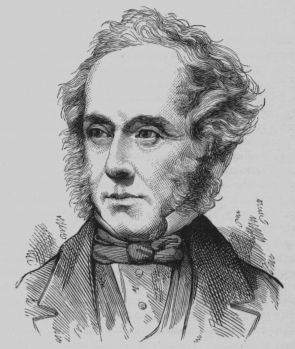Speech in the House of Commons (16 May 1820), quoted in George Henry Francis, Opinions and Policy of the Right Honourable Viscount Palmerston, G.C.B., M.P., &c. as Minister, Diplomatist, and Statesman, During More Than Forty Years of Public Life (London: Colburn and Co., 1852), pp. 15-16.
1820s
Henry John Temple, 3. Viscount Palmerston: Zitate auf Englisch
Speech at Tiverton (23 August 1864) on the Second Schleswig War, quoted in ‘Lord Palmerston At Tiverton’, The Times (24 August 1864), p. 9.
1860s
Letter to Sidney Herbert (20 December 1860), quoted in Jasper Ridley, Lord Palmerston (London: Constable, 1970), pp. 538-539.
1860s
Letter to Austen Henry Layard (23 October 1864), quoted in Jasper Ridley, Lord Palmerston (London: Constable, 1970), p. 590.
1860s
Strachey, Lytton. Victoria, Queen of Great Britain, 1819-1901. New York Harcourt, Brace And Company, 1921 via Project Gutenberg http://www.gutenberg.org/ebooks/1265
1860s
Letter to Lord de Grey (27 September 1865), quoted in Jasper Ridley, Lord Palmerston (London: Constable, 1970), p. 581.
1860s
“As to tenant-right, I may be allowed to say that I think it is equivalent to landlords' wrong.”
Speech http://hansard.millbanksystems.com/commons/1865/feb/27/adjourned-debate-resumed in the House of Commons (27 February 1865). The origin of the famous epigram, "Tenant right is landlord wrong."
1860s
Letter to Lord Panmure (11 October 1857), quoted in Sir George Douglas and Sir George Dalhousie Ramsay (eds.), The Panmure Papers (London: Hodder and Stoughton, 1908), pp. 446-447.
1850s
Letter to Thomas Milner Gibson (5 May 1864), quoted in Jasper Ridley, Lord Palmerston (London: Constable, 1970), p. 507.
1860s
Speech in the House of Commons (25 June 1850).
1850s
Letter to Gladstone (15 December 1859), quoted in Philip Guedalla (ed.), Gladstone and Palmerston, being the Correspondence of Lord Palmerston with Mr. Gladstone 1851-1865 (London: Victor Gollancz, 1928), pp. 115-117.
1850s
Speech in the House of Commons (3 February 1808) on the British bombardment of Copenhagen, quoted in George Henry Francis, Opinions and Policy of the Right Honourable Viscount Palmerston, G.C.B., M.P., &c. as Minister, Diplomatist, and Statesman, During More Than Forty Years of Public Life (London: Colburn and Co., 1852), pp. 1-3.
1800s
Speech in the House of Commons (8 March 1816), quoted in George Henry Francis, Opinions and Policy of the Right Honourable Viscount Palmerston, G.C.B., M.P., &c. as Minister, Diplomatist, and Statesman, During More Than Forty Years of Public Life (London: Colburn and Co., 1852), p. 12.
1810s
Speech in the House of Commons (3 March 1831), quoted in George Henry Francis, Opinions and Policy of the Right Honourable Viscount Palmerston, G.C.B., M.P., &c. as Minister, Diplomatist, and Statesman, During More Than Forty Years of Public Life (London: Colburn and Co., 1852), pp. 172-173.
1830s
Letter to William Ewart Gladstone (12 May 1864), quoted in Philip Guedalla (ed.), Gladstone and Palmerston, being the Correspondence of Lord Palmerston with Mr. Gladstone 1851-1865 (London: Victor Gollancz, 1928), pp. 281-282.
1860s
Speech in the House of Commons (18 June 1829) against the Duke of Wellington's foreign policy, quoted in George Henry Francis, Opinions and Policy of the Right Honourable Viscount Palmerston, G.C.B., M.P., &c. as Minister, Diplomatist, and Statesman, During More Than Forty Years of Public Life (London: Colburn and Co., 1852), pp. 128-129.
1820s
Letter to Gladstone (16 July 1860), quoted in Philip Guedalla (ed.), Gladstone and Palmerston, being the Correspondence of Lord Palmerston with Mr. Gladstone 1851-1865 (London: Victor Gollancz, 1928), pp. 142-143.
1860s
Letter to Lord Cowley (25 November 1859), quoted in Jasper Ridley, Lord Palmerston (London: Constable, 1970), p. 542.
1850s
Speech in the House of Commons (23 June 1813), quoted in George Henry Francis, Opinions and Policy of the Right Honourable Viscount Palmerston, G.C.B., M.P., &c. as Minister, Diplomatist, and Statesman, During More Than Forty Years of Public Life (London: Colburn and Co., 1852), p. 11.
1810s
Speech http://hansard.millbanksystems.com/commons/1854/mar/31/war-with-russia-the-queens-message in the House of Commons on the debate on war with Russia (31 March 1854).
1850s
“I will not talk of non-intervention, for it is not an English word.”
When an MP sought to correct Palmerston when he said "non-interference" instead of "non-intervention" in the House of Commons http://hansard.millbanksystems.com/commons/1832/aug/02/germany-protocol-of-the-diet (2 August 1832)
1830s
Speech to the Agricultural Association at Romsey, quoted in "Lord Palmerston At Romsey," The Times (16 December 1864), p. 12.
1860s
Letter to Lord Panmure (28 September 1857), quoted in Sir George Douglas and Sir George Dalhousie Ramsay (eds.), The Panmure Papers (London: Hodder and Stoughton, 1908), p. 436.
1850s
Letter to George Villiers, 4th Earl of Clarendon (20 October 1862), quoted in Jasper Ridley, Lord Palmerston (London: Constable, 1970), p. 559.
1860s
Letter to John Russell (6 December 1861), quoted in Jasper Ridley, Lord Palmerston (London: Constable, 1970), p. 554.
1860s
Remarks to Lord Shaftesbury at the dissolution of Parliament (July 1865), quoted in Edwin Hodder, The Life and Work of the Seventh Earl of Shaftesbury, K.G. Volume III (London: Cassell, 1886), pp. 187-188. Gladstone said in a speech (18 July) in Manchester after he had been elected for South Lancashire: "At last, my friends, I am come amongst you. And I am come - to use an expression which has of late become very famous, and which, if I judge the matter rightly, is not likely soon to be forgotten - I am come among you "unmuzzled."
1860s
Letter to William Ewart Gladstone (20 October 1853), quoted in Philip Guedalla (ed.), Gladstone and Palmerston, being the Correspondence of Lord Palmerston with Mr. Gladstone 1851-1865 (London: Victor Gollancz, 1928), pp. 95-96.
1850s
Letter to Queen Victoria (5 December 1861), quoted in Jasper Ridley, Lord Palmerston (London: Constable, 1970), p. 554.
1860s
Letter to Lord John Russell (4 November 1859), quoted in Jasper Ridley, Lord Palmerston (London: Constable, 1970), p. 534.
1850s
Letter to Captain Charles Elliot, RN https://archive.org/stream/internationalrel00mors/internationalrel00mors_djvu.txt, 21 April 1841
1840s
